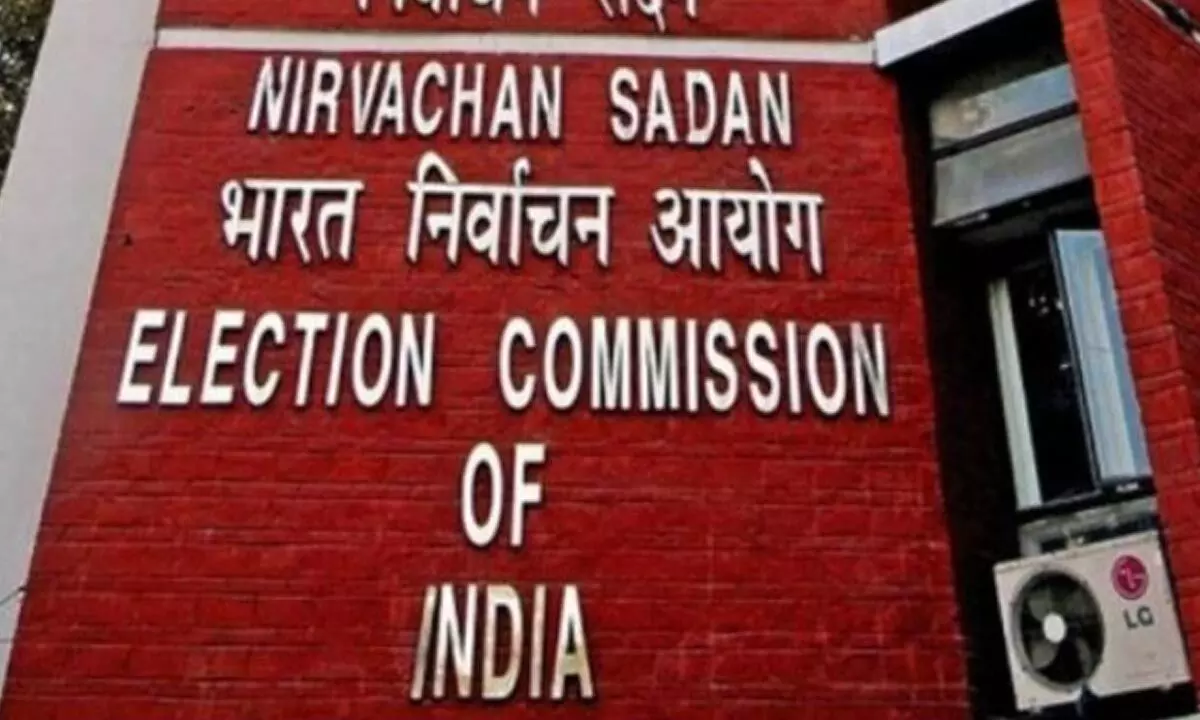Live
- Tanks, canals remain neglected despite execution of MGNREGS works
- BRS to celebrate Deeksha Diwas on Nov 29, Dec 9
- NCC Day grandly celebrated at SITAM
- CITU demands rollback of strategic sale of VSP
- 7-Year-old girl sexually assaulted in Tirupati
- PM Modi highlights govt's efforts to make Odisha prosperous and one of the fastest-growing states
- Hezbollah fires 200 rockets at northern, central Israel, injuring eight
- Allu Arjun's Family Appearance on Unstoppable with NBK Breaks Viewership Records
- Unity of hearts & minds essential for peace & progress, says J&K Lt Governor
- IPL 2025 Auction: I deserve Rs 18 cr price, says Chahal on being acquired by Punjab Kings
Just In
Invoking separatist sentiment in political campaign under MCC watch in J&K

The ‘Lakshman Rekha’ set by the MCC for the Lok Sabha elections clearly indicates that the days of violation are finally over in J&K and the rest of the country.
Srinagar: The ‘Lakshman Rekha’ set by the MCC for the Lok Sabha elections clearly indicates that the days of violation are finally over in J&K and the rest of the country.
The provisions included in the Model Code of Conduct (MCC) don’t leave any scope for misinterpreting or misunderstanding these provisions.
It is important to mention that in Kashmir, elections have been fought even by invoking semi-separatist sentiments.
One prominent political party publicly used green colour, rock salt and semi-separatist sentiments in the name of so-called regional aspirations in the past.
“Taboos are clearly defined and unless contesting parties and candidates decide to be thrown out of the ring, they have to adhere to the limits”, said Umar Wani, a noted advocate.
“Using semi-separatist slogans or evoking such sentiments is now a thing of the past. You say it and down comes the hammer of the election commission,” said Muzaffar Ahmad, 56, another senior advocate here.
The common man also believes that decency, decent language and behaviour will attract the voters and not the penalty defined by the MCC for the candidates.
“Election is after all, a legal and constitutional exercise. It does not leave any scope for slang and slander. If one cannot behave while seeking votes, how can we expect him/her to behave when elected?” asked Shabir Ahmad, 61, a senior voter.
It is interesting to note that while the MCC does not prohibit fact based criticism of rival political parties, political candidates/ institutions and offices, except constitutional institutions like the President of the country, the Supreme Court and the High courts and others in the constitutional scheme of the country are kept outside the scope of electoral campaign criticism.
“You are not fighting an election against any constitutional office/institution of the country and, therefore, bringing these into electoral discourse in bad light is punishable under the law. The constitution has given immense powers to the Election Commission to act against everybody, whether a contesting candidate or leader of any recognised or unrecognised political party/organisation to ensure that nothing that incites hatred among individuals and communities, violence, character assassination, stoking religious passions, etc., are adequately prevented and dealt with,” said the senior advocate.
A cursory reading of the MCC does not leave anything in the realm of obscurity for the common voter as well.
What can be done and what must not be done, is defined in terms of both law and morality.
The deterrents available with the election commission are strict and harsh for those who think they could escape by violating the MCC.
“Jail, fine, disqualification from contesting elections, derecognition of a violating political party and all other preventive and remedial measures leave no scope for crossing the ‘Lakshman Rekha’ set by the commission. If you thought you did it in the past and escaped action from the election commission then you are living in the fool’s paradise. The rules of the game are defined, you play according to these or get out of the electoral arena”, said an officer working one of the district electoral offices.
The whole District administration machinery, including police, are on deputation to Election Commission during the Election period.
There will be three Static Surveillance Teams (SST) in each Assembly area which is equivalent to one or two tehsils. They will be located at vital locations to check any movement -- rallies, transportation of unaccounted Cash/ drugs/ liquor, etc.
There will be 24 x 7 hour basis one Flying Surveillance Teams (FST) in each AC area which will go to all nook and corner of its jurisdiction within half hour of the complaint/ information. Whenever there is any Public Political Gathering/ Jalsa/ sabha, etc., it will be covered by a Video Surveillance Team (VST).
Almost all small or big such rallies/ sabha / majlis, etc., will be captured in digital form -- videographed, leaving no scope for later on clarification as “it was slip of tongue”.
Their job will be to report all such things to the control room and local police to take cognizance immediately. Details with regard to which act -- rules, their particular sections, nature as cognizable/ non-cognizable and punishment, if found guilty, will be carried in the next edition, said the officer of the district electoral office.

© 2024 Hyderabad Media House Limited/The Hans India. All rights reserved. Powered by hocalwire.com






